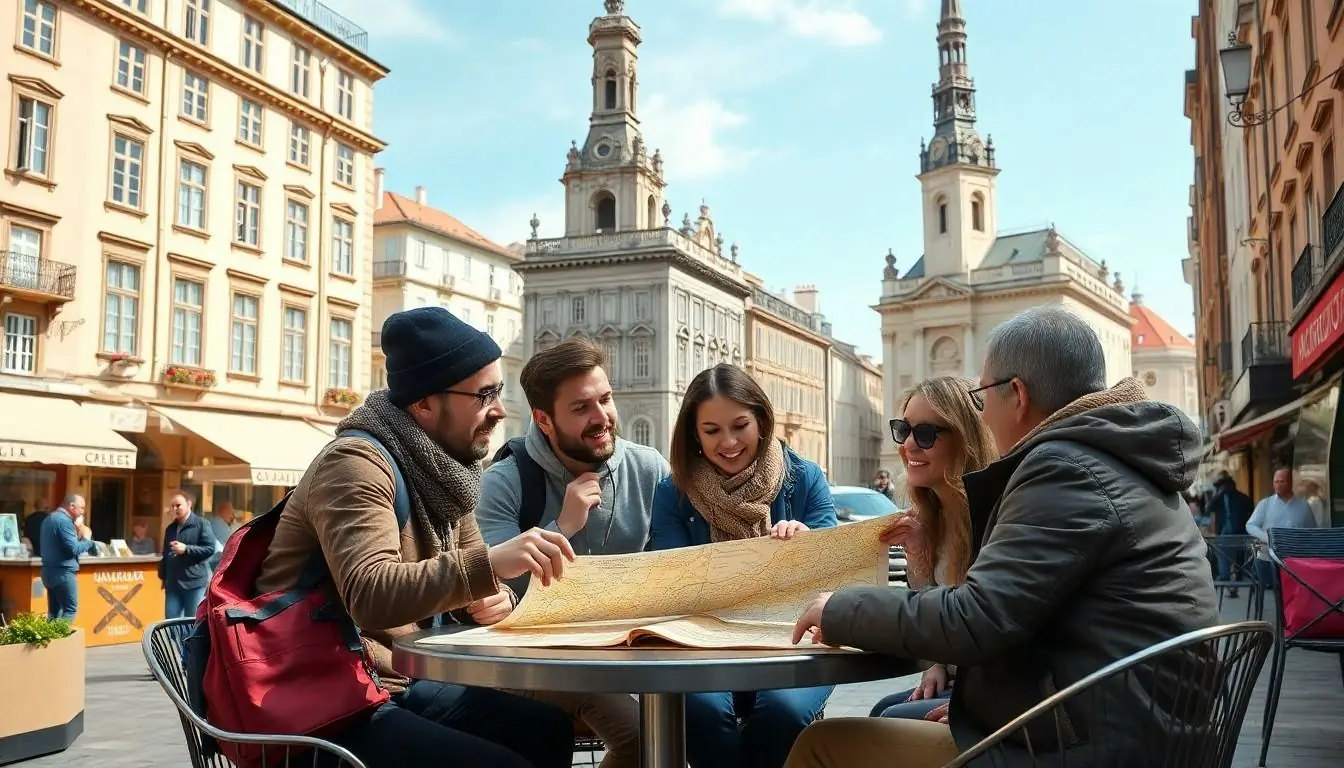Dreaming of sipping espresso in an Italian café or wandering the cobblestone streets of Paris without breaking the bank? Traveling to Europe on a budget isn’t just a fantasy; it’s a challenge that can turn into a thrilling adventure. With a little planning and some clever tips, anyone can explore the beauty of Europe without emptying their wallet.
Table of Contents
ToggleHow to Travel to Europe on a Budget
Travelers can explore Europe without breaking the bank by following some smart strategies. Researching flight deals months in advance often yields the best prices. Flexible travel dates can further reduce costs, allowing for lower fares on specific days. Cities like Budapest, Lisbon, and Prague offer affordable accommodations and dining options.
Utilizing public transportation proves economical. Trains and buses connect major cities, often at a fraction of the cost of flights. Booking train tickets early can unlock significant savings. For city exploration, walking tours provide an opportunity to discover hidden gems at little or no cost.
Eating like a local can significantly lower food expenses. Grocery stores and local markets frequently offer fresh and inexpensive options. Street food serves as a convenient and affordable way to indulge in authentic cuisine. Travelers might also seek restaurants frequented by locals rather than tourist hotspots.
Staying in hostels or budget hotels contributes to a frugal experience. Sites like Hostelworld and Airbnb provide diverse lodging options that fit any budget. Meaningful interactions with fellow travelers can enhance the experience, creating lasting memories.
Exploring free attractions enhances the journey without additional costs. Many museums offer free admission on specific days. Parks, plazas, and outdoor markets feature unique cultures, allowing for immersive experiences.
Planning an itinerary featuring free events and activities ensures that a trip remains within budget. Cultural festivals and local fairs may be available at little to no cost, enriching the travel experience. Combining these tips creates a fulfilling European adventure while staying on budget.
Planning Your Trip

Budget-friendly travel to Europe starts with solid planning. Establishing a clear budget helps set financial boundaries for the journey.
Setting a Budget
A well-defined budget outlines daily expenses like accommodation, food, and activities. Consider allocating specific amounts for lodging and dining, ensuring enough flexibility for unforeseen costs. Setting aside funds for transportation and entry fees to attractions also proves beneficial. Assess past travel expenses to estimate realistic limits, allowing for savings opportunities, like using travel rewards for flights or accommodations. Prioritizing essentials over luxuries enhances the overall experience without overspending.
Choosing Destinations Wisely
Selecting the right destinations significantly influences the overall cost of the trip. Opting for cities like Budapest, Lisbon, or Prague provides affordable lodging and local cuisine. Each city features a host of free attractions, including parks and museums with no admission charges. Researching regional events ensures access to culturally enriching experiences without hefty price tags. Exploring lesser-known towns also opens doors to authentic experiences at a fraction of the cost, making travel budget-friendly while still enjoyable.
Transportation Options
Traveling across Europe on a budget involves exploring various transportation methods. Options include flying, trains, buses, and even rideshare services, enabling travelers to save money while exploring the continent.
Flying vs. Trains
Flying offers a quick way to cover long distances, often connecting major cities efficiently. Budget airlines frequently provide low-fare tickets, especially when booked in advance. Trains excel in scenic routes, and several European countries boast extensive rail networks. Traveling by train allows for a leisurely journey, with opportunities to admire landscapes. While flights can be cheaper sometimes, train travel allows city-to-city convenience without the hassle of airports.
Budget Airlines and Rail Passes
Budget airlines often feature substantial discounts, making them attractive for budget travelers. Airlines like Ryanair and EasyJet serve a wide range of European destinations. Passengers can save considerably if they remain flexible with flight dates. Rail passes, like the Eurail Pass, enable unlimited train travel within a defined time frame, offering flexibility. Such passes suit travelers planning extensive train journeys by providing cost-effective options to explore multiple countries without breaking the bank.
Affordable Accommodation
Finding affordable accommodation is key to enjoying European travel without overspending. Various options exist that cater to budget-conscious travelers.
Hostels and Guesthouses
Hostels offer a cost-effective stay while fostering a social atmosphere. Shared rooms often range from $15 to $50 per night, depending on the location. Guesthouses provide more privacy and usually cost between $30 and $100 per night. Many hostels and guesthouses include amenities like free Wi-Fi and communal kitchens, allowing guests to save more on meals. Seeking out hostels in neighborhoods outside city centers can result in even lower prices with a local vibe. Engaging with fellow travelers in these spaces can enhance the experience, providing valuable travel tips.
Alternative Lodging Options
Alternative lodging options can be a great way to save while still enjoying comfort. Airbnb and vacation rentals typically range from $40 to $120 per night, offering the chance to cook and enjoy local neighborhoods. Camping presents an adventurous alternative, with sites available for as low as $10 to $30 per night, especially in scenic areas. Additionally, some cities feature religious accommodations, like monasteries or convents, often costing $25 to $70 per night. Exploring less popular destinations can yield lower lodging costs with unique experiences. Travelers benefit from combining these options to create a tailored and budget-friendly stay.
Eating on a Budget
Eating on a budget in Europe doesn’t mean sacrificing flavor or quality. Travelers can enjoy fresh, delicious meals by choosing smart options.
Local Markets and Street Food
Local markets offer a vibrant selection of affordable produce, meats, and snacks. Exploring these markets, travelers can sample regional specialties without overspending. Street food vendors serve generous portions at low prices, showcasing the country’s culinary essence. For instance, a baguette sandwich in Paris or a döner kebab in Berlin provides quick, satisfying meals. These options often cost under $10, making them ideal for budget-conscious travelers. Embracing local flavors in informal settings fosters authentic experiences while keeping food costs manageable.
Cooking Your Own Meals
Preparing meals in shared kitchens available in hostels or guesthouses can significantly cut food expenses. Shopping at local grocery stores enables travelers to find ingredients for simple, wholesome dishes. A pasta dish with fresh vegetables or a hearty salad requires minimal preparation and remains budget-friendly. Additionally, many accommodations offer tools like stovetops and utensils, making cooking convenient. By focusing on affordable ingredients, travelers can enjoy multiple meals for under $30, allowing more funds for activities and experiences. Cooking fosters camaraderie among fellow travelers, creating opportunities to share tips and recipes while enjoying delicious meals together.
Free or Low-Cost Activities
Travelers can enjoy plenty of free or low-cost activities while exploring Europe. Engaging in local attractions and outdoor adventures enhances the experience without straining the budget.
Local Attractions and Museums
Many cities throughout Europe offer museums and historical sites with free admission days or discounts. For instance, visitors in Paris can access the Louvre for free on the first Saturday of each month. Similarly, local art galleries often feature exhibits at no cost. Parks and gardens serve as excellent spots for relaxation and sightseeing, showcasing natural beauty alongside local history. Event calendars frequently include festivals, exhibitions, or concerts that are free to attend. Exploring these attractions enriches the travel experience while maintaining affordability.
Outdoor Adventures
Outdoor experiences in Europe provide adventure without high costs. National parks in countries like Switzerland or Slovenia offer stunning landscapes and hiking trails that require no entrance fee. Walking or cycling through city streets allows travelers to discover hidden gems while enjoying the fresh air. Beaches in coastal areas, such as Dubrovnik or Barcelona, invite relaxation and fun free of charge. Engaging in activities like picnics in local parks enhances the cultural exploration while serving as an enjoyable way to connect with fellow travelers. Finding these outdoor pursuits keeps the travel excitement alive within budgetary limits.
Traveling to Europe on a budget is entirely possible with the right approach. By prioritizing planning and making informed choices, travelers can uncover the continent’s hidden gems without breaking the bank. Embracing local culture through affordable dining and engaging in free activities can lead to unforgettable experiences.
Opting for budget accommodations and utilizing various transportation options ensures that every aspect of the trip remains financially manageable. With a little creativity and flexibility, anyone can enjoy the beauty and diversity of Europe while sticking to their budget. The adventure awaits, and it’s time to explore all that Europe has to offer without overspending.



